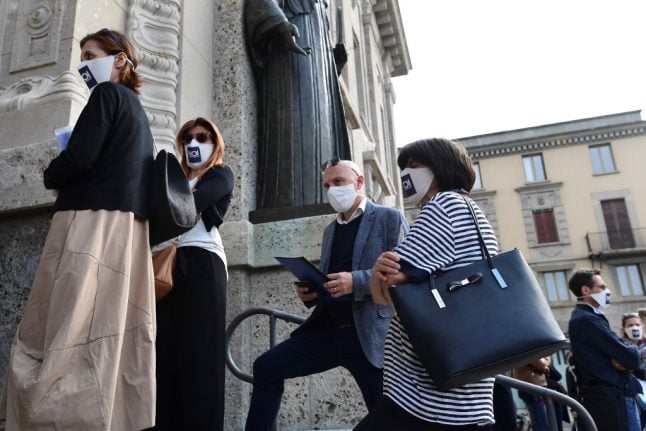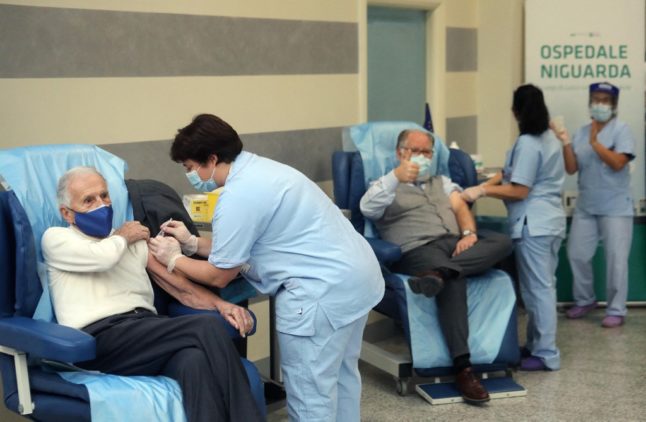“We don't want revenge, we want justice,” said Stefano Fusco, 31, who created a group on Facebook to reach out to others in similar situations after his grandfather died of the virus in a care home in March.
Italy’s official death toll – which many experts believe is underestimated – is now over 34,000.
The complaints were filed at the prosecutors' office in the city of Bergamo, in Lombardy, northern Italy, the area worst hit by the pandemic, “because it has become the symbol of this tragedy, though they come from across the country,” Fusco said.

A parish priest stands by bodies of Covid-19 victims which were temporarily stored in the church of San Giuseppe in Seriate, Bergamo, at the height of the pandemic in late March. Photo: AFP
Bergamo prosecutors are conducting a wide-ranging investigation into the health crisis. Local families blame tardiness in enforcing a red zone, as well as years of cuts to healthcare across the northern Lombardy region.
Cristina Longhini, a 39-year old pharmacist, lost her father Claudio, 65. Although he was very sick, the emergency services initially refused to admit him to hospital unless he was having trouble breathing, she said.
Once he was eventually taken to a Covid-19 hospital in Bergamo, there were no beds free in intensive care. Longhini says the family was asked to try to find an intensive bed somewhere else — which they desperately tried, and failed, to do.
'No-one has apologised'
“They forgot to call us to say he had passed away,” Longhini told AFP.
“I went to identify his body, he was almost unrecognisable. His mouth was open, his eyes bulging, with tears of blood”.
“They gave me his personal belongings in a bin bag, including his bloody clothes, which were contaminated,” she said.
With the local cemeteries overflowing, his coffin was carted off by army trucks along with dozens of others. The family only found out where he had been taken when they received a bill for his cremation some 200 kilometres (125 miles) away, she said.

Army trucks transporting the dead out of the overwhelmed Lombardy region for cremation at the height of the pandemic in late March. Photo: AFP
Longhini said she was filing a complaint because “we don't think the crisis was handled correctly, no-one's taking responsibility, and no-one has apologised”.
While in other countries legal action is being taken against specific entities — citizens against the government in France, doctors against theirs in Zimbabwe — the Italian complaints are against “persons unknown”.
“We are submitting them to see whether laws have been broken, and will evaluate the next steps after that,” Fusco said.
Another 150 complaints were being prepared, he said.
'We were abandoned'
The Facebook page “Truth and Justice for COVID-19 victims” currently has over 55,000 members.
Diego Federici, 35, who lost both his parents to the virus in the space of four days, said: “we don't want compensation. No sum of money could give me my parents back.
“We want to make sure those who are responsible pay, and ensure something like this can never happen again.”
Laura Cappella, 57, sobbed as she described her father dying alone after overstretched doctors failed to even give him a CT scan.
“I didn't get to say goodbye,” she said.
“We were abandoned, and still feel abandoned”.

Members of the “Noi Denunceremo” (We will report) committee outside the Bergamo's prosecutor building on June 10th. Photo: AFP



 Please whitelist us to continue reading.
Please whitelist us to continue reading.
Member comments